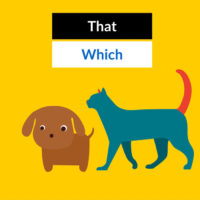Grammar Tidbits: ‘That’ vs ‘Which’
It’s a common trouble spot for a lot of people — creating a story or document and the words are flowing easily, but then the conundrum of ‘that’ or ‘which’ arises.
Do you rewrite the sentence to avoid the confusion all together? Do you flip a coin to decide? Or maybe you just go with what sounds the best. After reading this grammar-ease tip, I hope the confusion will be removed.
It can be simple: If a restrictive clause, use that. If an unrestrictive clause, us which.
What does that mean?
A restrictive clause is part of a sentence you can’t get rid of; it’s necessary for the meaning.
- Dogs that bark are disruptive. (Without ‘that bark’, you’d have “Dogs are disruptive.” Unless you want to say that all dogs are disruptive, you need ‘that bark’ in the sentence.)
- The vase that you dropped was a priceless antique. (You can see how ‘that you dropped’ clarifies the meaning.)
- He refused to sit in the chair that his wife put together. (he might trust a chair that he put together himself!)
- Gifts that keep on giving are her favorite. (not all gifts are her favorite)
- Vehicles that have hybrid technology get great gas mileage. (in other words, not all vehicles get great gas mileage)
A non-restrictive clause is a phrase that can be removed from a sentence without losing the meaning (if you take out the ‘which’ phrase in any of the next examples, the remaining part of the sentence hasn’t changed its meaning). A non-restrictive clause adds non-defining details.
- His new running shoes, which were expensive, wore out after only five miles of use. (you don’t really need to know the running shoes were expensive)
- There was a landslide at the resort yesterday, which is bad news for vacationers. (one can infer a landslide is bad news)
- Cats, which are great pets, can be quite destructive at times. (not just cats can be great pets)
- She signed up for the continuing education class, which is free for all town residents. (the details about the class being free aren’t necessary — they can be useful, but not required in regard to knowing she simply signed up for a class)
- Your task, which is to keep the squirrels out of the bird feeders, will be a never-ending chore.
- The book, which I had at the lake, is the one I wanted you to check out.
Tip: when using ‘which’ it’s common to offset the non-description phrase with commas; you won’t find restrictive clauses offset with commas (in most cases).
Of course, there are always exceptions, and you may simply prefer to use ‘which’ instead of ‘that’ at times. These examples were to give a straightforward, clean way of looking at the two words.
I don’t use ‘which’ all that often. I find that I can write tighter when not using it.
Did these examples help clarify the differences?


1 thought on “Grammar Tidbits: ‘That’ vs ‘Which’”
Filomena Day March 27, 2017 at 7:23 pm
Very helpful and useful!